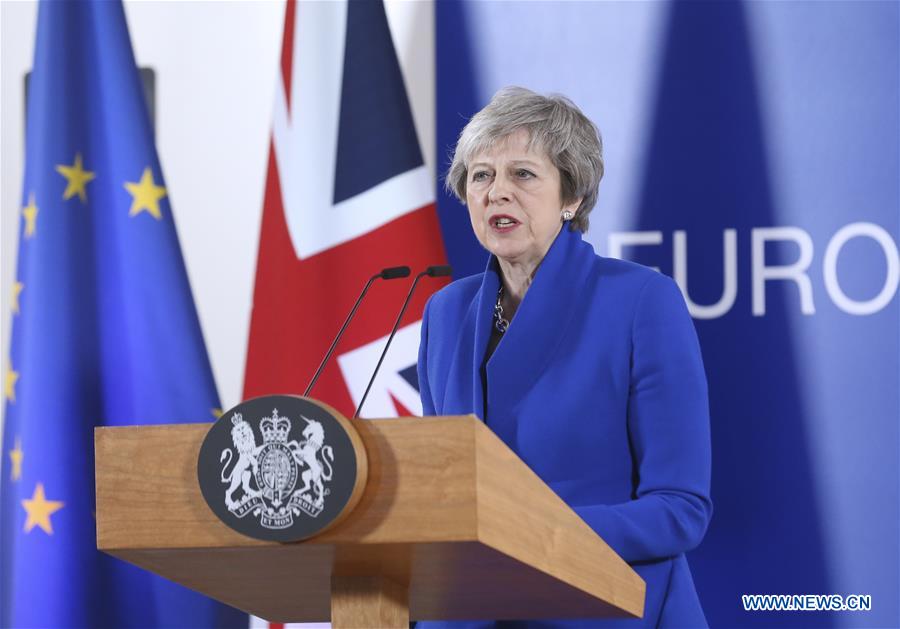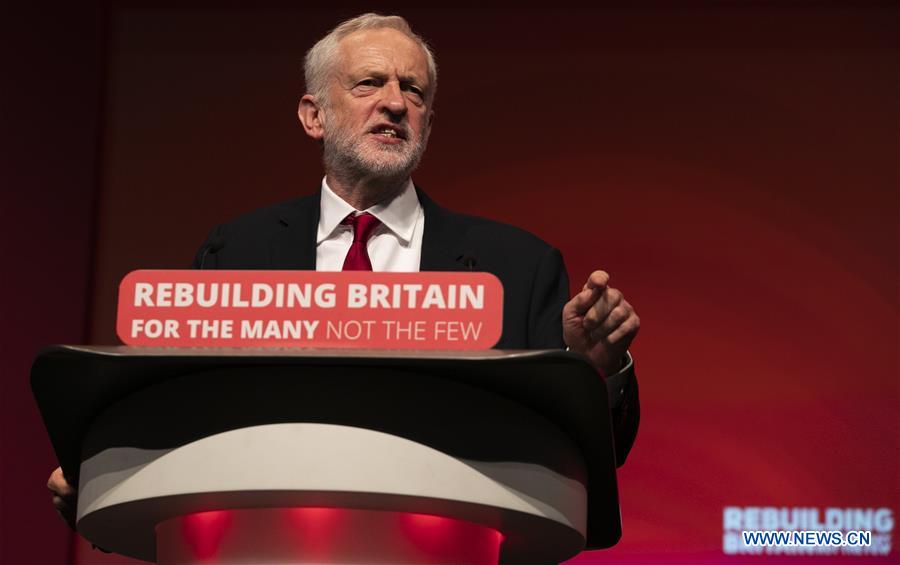British politics in chaos
- By Heiko Khoo
 0 Comment(s)
0 Comment(s) Print
Print E-mail China.org.cn, December 4, 2018
E-mail China.org.cn, December 4, 2018

Armed with a Brexit deal signed off by the European Union, Britain's Prime Minister Theresa May is now fighting for her political career. If parliament accepts the deal, she will stay in office but her own Conservative Party may be torn apart by internal division.
If parliament rejects the deal, her own position as prime minister almost certainly becomes untenable, so then a Conservative Party leadership contest is likely. Alternatively, parliament could accept the deal and then pass a no-confidence vote in the government leading to a General Election. This scenario is unlikely as the Conservative Party MPs may despise May's deal but fear that an election is likely to return a Labour Party government under its leftwing leader Jeremy Corbyn.
May's deal with the EU is, essentially, a delaying tactic. The big decisions on the role of the European Court of Justice, the economic and trade relations and the immigration rules, will remain subject to future negotiations that will continue for years after the official leave date of March 31, 2019. Conservative critics led by Jacob Rees-Mogg MP and Boris Johnson MP point out that the agreement makes the whole of Ireland subject to EU laws on customs and this will mean the de facto division of Northern Ireland, which is part of the U.K., from the British mainland.
At the last General Election in 2017 Theresa May was only able to cobble together a majority government with the support of the right-wing protestant Democratic Unionist Party (DUP). The DUP is staunchly against any change in the status of Northern Ireland as part of Britain. It has close historical links to right wing paramilitaries and terrorists opposed to Irish unification.
And, as the deal offers the Republic of Ireland, through the EU, control over Northern Ireland's trade in goods, the DUP is implacably opposed to May's proposals. Without the DUP votes May loses her majority and so is forced to seek votes from elsewhere. Compounding her problem is the fact that as many as 80 Conservative MPs are hostile to her deal. Most come from the EU hostile rightwing, led by Rees-Mogg, who are hoping to force a Conservative Party leadership contest in the near future; but others, from factions that supported remaining in the EU, feel that full EU membership is better than what is presently on offer. A parliamentary vote is due as early as December 11, 2018 and will likely be rejected.

However, whereas it would be normal in such circumstances for the government to resign and call a General Election, the fear of a major electoral defeat for the Conservatives means that an election is improbable. This is because the big fear on the part of the British establishment is that Labour will win a landslide election victory under Jeremy Corbyn's leadership. Corbyn has set his benchmark for an agreement with the EU as one that continues the benefits of EU trade relations, maintains progressive EU laws and regulations on workers' rights, but has greater control over immigration; although the detail of the latter concept remains unclear.
The Liberal-Democrats, the Scottish National Party and a large proportion of Labour's MPs, who think leaving the EU is a disaster, would like to overturn the results of the 2016 Brexit referendum. They argue that the voters were lied to about the consequences of leaving the EU and that the leave campaign was partly funded by illegal means. For them, this negates the moral weight of the referendum. They say that now that a deal is on the table the people should be able to vote on whether they want to accept it or, either leave the EU with no deal or remain in the EU after all. These forces were behind a very large demonstration on October 20, 2018 which saw over half a million take to the streets of London calling for some sort of "People's Vote."
Theresa May's personal options are narrowing. Squeezed between pressures pulling in different directions her argument is that her deal is an agreement to leave the EU, it is the only deal in town and, above all, in an appeal to the public she says let's just get this over with! I think this view does have a strong base of support. After all, only a few thousand people in Britain will read the exact terms of the deal, which is a legal agreement that is more than 500 pages long.
The problem for Theresa May and any Conservative Party leadership challenger is that the government in office will inevitably be blamed for failures to meet expectations. To keep their parliamentary seats the Conservatives have to be able to keep voters on board. Her deal angers the majority of party members and simultaneously fails to satisfy the aspirations of Brexit supporters. The voter profile involved is the natural constituency of the far-right, whose form, if we see beyond everyday political debate, is becoming discernible through the fog. Sections of the Conservative Party led by Boris Johnson and Rees-Mogg, will establish a de facto alliance with Nigel Farage's United Kingdom Independence Party and other anti-immigrant forces on the far-right.
The British public remains sharply divided and they naturally blame the government for the whole process. Over the last years Jeremy Corbyn faced an unceasing campaign of sabotage by his internal opponents in Parliament. This undermined public support for Labour in the polls. However, Theresa May's internal problems have taken center stage, so this should negate the impact of Labour's parliamentary divisions on its electoral prospects. Therefore, sooner or later a Labour government is the most likely end game of the chaos engulfing Westminster.
Heiko Khoo is a columnist with China.org.cn.
For more information please visit:http://china.org.cn/opinion/heikokhoo.htm
Opinion articles reflect the views of their authors, not necessarily those of China.org.cn.





